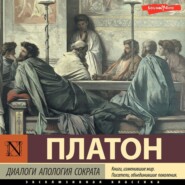По всем вопросам обращайтесь на: info@litportal.ru
(©) 2003-2024.
✖
Sophist
Настройки чтения
Размер шрифта
Высота строк
Поля
THEAETETUS: Yes, that is the term.
STRANGER: Of this barb-fishing, that which strikes the fish who is below from above is called spearing, because this is the way in which the three-pronged spears are mostly used.
THEAETETUS: Yes, it is often called so.
STRANGER: Then now there is only one kind remaining.
THEAETETUS: What is that?
STRANGER: When a hook is used, and the fish is not struck in any chance part of his body, as he is with the spear, but only about the head and mouth, and is then drawn out from below upwards with reeds and rods: – What is the right name of that mode of fishing, Theaetetus?
THEAETETUS: I suspect that we have now discovered the object of our search.
STRANGER: Then now you and I have come to an understanding not only about the name of the angler's art, but about the definition of the thing itself. One half of all art was acquisitive – half of the acquisitive art was conquest or taking by force, half of this was hunting, and half of hunting was hunting animals, half of this was hunting water animals – of this again, the under half was fishing, half of fishing was striking; a part of striking was fishing with a barb, and one half of this again, being the kind which strikes with a hook and draws the fish from below upwards, is the art which we have been seeking, and which from the nature of the operation is denoted angling or drawing up (aspalieutike, anaspasthai).
THEAETETUS: The result has been quite satisfactorily brought out.
STRANGER: And now, following this pattern, let us endeavour to find out what a Sophist is.
THEAETETUS: By all means.
STRANGER: The first question about the angler was, whether he was a skilled artist or unskilled?
THEAETETUS: True.
STRANGER: And shall we call our new friend unskilled, or a thorough master of his craft?
THEAETETUS: Certainly not unskilled, for his name, as, indeed, you imply, must surely express his nature.
STRANGER: Then he must be supposed to have some art.
THEAETETUS: What art?
STRANGER: By heaven, they are cousins! it never occurred to us.
THEAETETUS: Who are cousins?
STRANGER: The angler and the Sophist.
THEAETETUS: In what way are they related?
STRANGER: They both appear to me to be hunters.
THEAETETUS: How the Sophist? Of the other we have spoken.
STRANGER: You remember our division of hunting, into hunting after swimming animals and land animals?
THEAETETUS: Yes.
STRANGER: And you remember that we subdivided the swimming and left the land animals, saying that there were many kinds of them?
THEAETETUS: Certainly.
STRANGER: Thus far, then, the Sophist and the angler, starting from the art of acquiring, take the same road?
THEAETETUS: So it would appear.
STRANGER: Their paths diverge when they reach the art of animal hunting; the one going to the sea-shore, and to the rivers and to the lakes, and angling for the animals which are in them.
THEAETETUS: Very true.
STRANGER: While the other goes to land and water of another sort – rivers of wealth and broad meadow-lands of generous youth; and he also is intending to take the animals which are in them.
THEAETETUS: What do you mean?
STRANGER: Of hunting on land there are two principal divisions.
THEAETETUS: What are they?
STRANGER: One is the hunting of tame, and the other of wild animals.
THEAETETUS: But are tame animals ever hunted?
STRANGER: Yes, if you include man under tame animals. But if you like you may say that there are no tame animals, or that, if there are, man is not among them; or you may say that man is a tame animal but is not hunted – you shall decide which of these alternatives you prefer.
THEAETETUS: I should say, Stranger, that man is a tame animal, and I admit that he is hunted.
STRANGER: Then let us divide the hunting of tame animals into two parts.
THEAETETUS: How shall we make the division?
STRANGER: Let us define piracy, man-stealing, tyranny, the whole military art, by one name, as hunting with violence.
THEAETETUS: Very good.
STRANGER: But the art of the lawyer, of the popular orator, and the art of conversation may be called in one word the art of persuasion.
THEAETETUS: True.
STRANGER: And of persuasion, there may be said to be two kinds?
THEAETETUS: What are they?
STRANGER: One is private, and the other public.
THEAETETUS: Yes; each of them forms a class.
STRANGER: And of private hunting, one sort receives hire, and the other brings gifts.

















